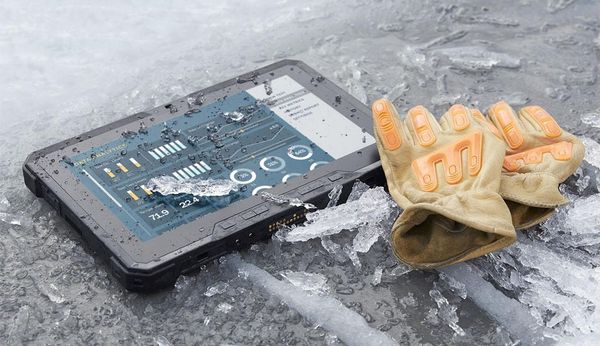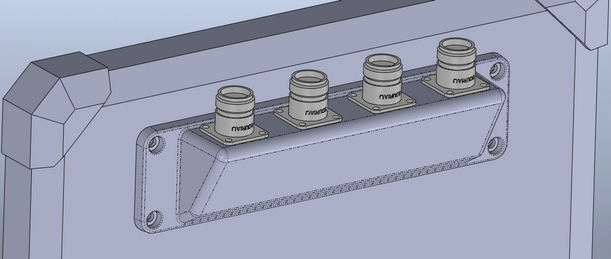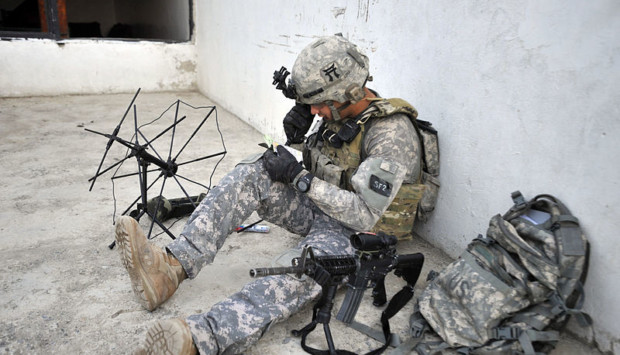The theatre of war
You could be forgiven for thinking that militarising a rugged tablet, a device often tested to military standards, may be surplus to requirements. But as any soldier will tell you, the tougher the tablet, better. It’s vital that electronic devices used in the theatre of war remain performant despite being subject to extreme conditions. And it’s not just survivability that’s important; how you maintain secure communications far behind enemy lines is critical for intelligence gathering.
Field work is exactly that – operations undertaken in the field, and therefore suited to a mobile solution. Working under the desert sun where effective cooling and sunlight readable screens are essential, or during a night operation where one-touch dimming and silent running are required, rugged tablets deliver the flexibility required to perform a variety of roles.
Their small form factor and light weight enables them to go places laptops and servers can’t, while offering more connectivity and readability than a phone or handheld. At Captec, we have previously employed the Dell Latitude 7212 and leveraged their own test to fail methodology[1] to exceed the high standards expected within the defence vertical.
Staying connected
A typical example we have supported is the manpack – electronic equipment stored and transported in a backpack for rapid deployment by a dismounted soldier. Much of this equipment, which consists of modems, antenna, and drone controllers, will be fitted with I/O ports certified to standards created specifically for use within military applications.
The demand is great enough that there are multiple manufacturers who exist solely to produce these military connectors[2]. They are designed to allow accurate location and mating by touch alone, which is especially handy in low visibility scenarios. They are also tightly secured once coupled, which is good news for anyone who’s old enough to know the pain of having their video game controllers being ripped from the console by a careless sibling. This is great for in-vehicle applications where terrain doesn’t lend itself to a smooth ride. And finally, but just as importantly, the sockets remain IP-rated once connected, meaning no fears of short circuits or dodgy connectivity. This all sounds great, before you realise that none of the rugged tablets from the major brands are fitted with military connectors, so despite their suitability for these applications, they can’t connect with the rest of the estate.
The process of militarising a rugged tablet
There’s a variety of ways through which the militarisation of a rugged tablet can be achieved, and which one is most appropriate depends heavily on the use case. For in-vehicle? A custom VESA dock with modified, IP-rated triple pass-through SMA connections. For a forward operating base? Bespoke, lightweight desk dock bristling with capped MIL-DTL-38999 connectors. For satellite communication to the brigade HQ? Specialised and expanded case housing multiple, hot-swappable 7000mAh batteries and PoE ports.
None of these solutions impact the original ruggedness of the tablet, while enabling additional connectivity and utility. Often unnecessary in civilian environments, expedited setup and tear down can be a matter of life and death for militarised tablets. When under fire in hostile territory, it’s vital that equipment is securely and rapidly dismantled, which an in-built rear case or single hand undocking process can achieve.
The elephant in the room
Despite being at the bleeding edge of many technologies, as is the case in many massive, complex organisations, there can be unwieldy legacy software which is awkward and expensive to refresh. Perhaps they’re installed on certain hardpoints deep within a military vessel, which itself has a lifespan of decades. Or it is software so niche, so precise, that running it on anything other than its native, programmed-for hardware causes issues. Mobile technology is reaching a point where this gap can be bridged economically, with rugged tablets and Captec’s engineering offering providing a turnkey solution optimised for defence environments. When you need something to fit in a submarine locker where space is at even more of a premium than a rush hour tube in August, a tablet with customisable software and hardware can be a great fit.
Exceptions and concessions
Understandably, laptops and tablets aren’t always a great fit for some applications. Sometimes what’s necessary is what I affectionately refer to as a “tank TV” – a military panel PC for use within tanks. Perhaps a full fat server for drone sensor data is needed for a forward operating base. The one caveat here is that these ultra-specialised products tend to carry a heavy cost. In cases similar to these, it’s worth considering whether a militarised tablet can meet requirements economically. Not always the first thought when specifying devices for a military environment, a rugged tablet can easily and effectively be outfitted for specific applications and proprietary connectors, something which happens to be one of our specialities!
Learn more about our tablet customisation service here.
[1] http://www.dell.com/learn/us/en/19/videos~en/documents~latitude-rugged-ice-videos-en-ch.aspx
[2] http://www.amphenol.co.uk/
[3] http://www.te.com/usa-en/home.html







